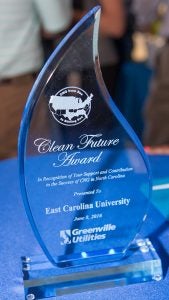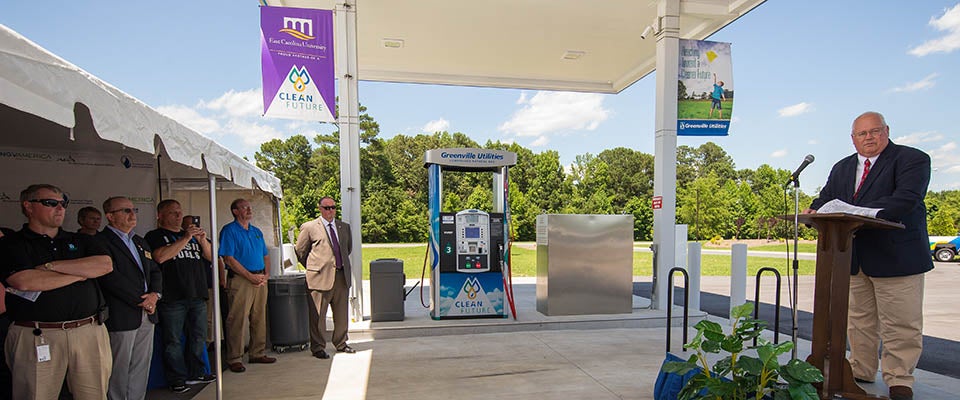CLEAN FUTURE
New ECU buses will save money, reduce emissions
East Carolina University Transit received the inaugural Clean Future Award from Greenville Utilities Commission on June 8.
The award was presented by GUC officials at a ceremony at its new natural gas fueling station during a stop on a national tour highlighting the benefits of natural gas.
GUC recognized ECU for the addition of the university’s first compressed natural gas powered buses, which will start service in December.
Instead of using petroleum, the buses run on compressed natural gas, or CNG. An alternative to gasoline, CNG consists of mostly methane and costs 40 to 50 percent less. According to the Environmental Protection Agency, CNG has a narrow flammability range, making it less volatile than gasoline. CNG is also nontoxic and emits up to 90 percent fewer emissions than gasoline.
The two new buses were manufactured by Gillig in Hayward, California at a cost of $550,000 each. ECU operates 28 Gillig buses in its fleet — 26 diesel and two diesel/electric hybrids. The new CNG buses are expected to reduce annual petroleum consumption by 15,000 gallons.
“The buses highlight ECU’s commitment to clean fuels, clean air, community partnerships and reducing petroleum consumption,” said Wood G. Davidson, director of ECU Transit.

ECU Transit received the first Clean Future Award presented by GUC.
At current gas prices, the new buses could save ECU approximately $35,000 per year. In comparison, diesel buses cost approximately $300,000 and use around 10,440 gallons per year costing $24,325 annually, according to the U.S. Department of Energy.
“The use of CNG will displace 100 percent of the petroleum we would have used in these buses over their 15-year life expectancy,” said Davidson.
The two new CNG buses will replace two older model buses that have exceeded their service life. The new CNG buses will mainly be used on 301 Gold and 850 Pirate Ride routes, which serve West End, College Hill and Curry Court. Because the buses produce less engine noise and are more efficient than diesel buses, they will be on the routes operating through campus, Davidson said.
Dr. Virginia Hardy, vice chancellor of student affairs at ECU and former chairwoman of the GUC board, said, “ECU is happy to be a part of the CNG movement in Greenville.”
Recently, GUC expanded its natural gas services and opened Pitt County’s first CNG fueling station at 290 Easy Street in Greenville. The station operates two fueling islands, but can add up to four islands in the future.
During the ceremony, Waste Industries also was recognized for its fleet’s conversion to CNG. At ECU, other ongoing sustainability efforts include water bottle refill stations, a bike repair station and cisterns on campus. A Freight Farm will be installed over the summer behind Todd Dining Hall for vertical farming and year-round growing. This fall, Todd and West End Dining Halls will be piloting a program for composting food waste, said Chad Carwein, ECU’s sustainability manager.

Officials gather at the new CNG fueling station, a stop on the national Sea to Shining Sea Rally, where organizer Pat Riley addressed the crowd.
